The document describes the various forms of professional learning teachers engage in during and after their pre-service training and the range of professional learning experiences available through their workplace, the Ministry of Education, faculties of education, professional organizations, federations and subject associations. Amendments to Regulation 184/97, Teachers’ Qualifi-cations were approved to introduce a requirement for language proficiency and criminal record checks. The Council also approved labour mobility provisions of the Agreement on Internal Trade/Teaching Profession that will enable teachers certified in Ontario to acquire a licence to teach anywhere in Canada. Under the terms of the agreement, the certification process for teachers trained in one jurisdiction and wanting to teach in another will be better defined and streamlined. Membership rose to 177,718, up by 3,248 over 1999. This higher than expected membership and much higher than forecast advertising revenue from Professionally Speaking allowed the College to absorb higher than expected disciplinary costs. The final excess of revenue over expenses of $132,000 on a total operating budget of $17.67 million was very close to the planned balanced budget.
In 2000, the College of Teachers welcomed a new Registrar, J. W. (Joe) Atkinson, and a new Council Chair, Larry M. Capstick. There were a number of changes to the College Council’s membership during the year. During the year, five new public members were appointed: Samy Appadurai, Douglas Brown, Janet Cornwall, Martin Kings and Elayne McDermid. The College’s second Council elections were held
in October 2000. Ten new members were selected by their professional colleagues to sit on Council for the first time and seven members were returned for a second term.
The first-time Council members are: Karl Dean, elected in the Southwest Region; Jerry De Quetteville, Southcentral Region; Mark Lefebvre, English-language Roman Catholic elementary category; Dick Malowney, Supervisory Officer category; Elizabeth Papadopoulos, Central Region; and Rich Prophet, who was elected in the Northwest Region category. Four new Council members were acclaimed: Bernard J. Adam, in the French-language Public Elementary/ Secondary category; Guill Archambault, in the French-language Roman Catholic Secondary category; Audrey Hadfield, in the Private School category; Iain Munro, in the Faculty of Education category. The seven members returning to Council were Larry Capstick, re-elected in the English-language Public Secondary category; Doug Carter, Southeast Region; Sterling Campbell, originally appointed mid-term to replace a retiring member, elected in the Northeast Region category; Margaret Dempsey, re-elected in the Principal/Vice-Principal category; Nancy Hutcheson, elected to the first Council as the Northern Ontario Elementary member until she moved out of the area, elected in the English-language Public Elementary category; and Harry Mulvale, English-language Roman Catholic Secondary category. The seventh returning member is Marilyn Laframboise, acclaimed in the French-language Roman Catholic Elementary category.
T h e E x e c u t i v e C o m m i t t e e
The Executive Committee reviews the work of other College committees, refers matters to them as appropriate and conducts the ongoing business of the College between meetings of Council.
Committee Activities
The committee had a busy year and met a total of 13 times in 2000. The committee directed the Registrar to negotiate the lease for additional office space at the College’s current premises to accommodate the increased workload associated with investigating complaints and holding disciplinary hearings, and to meet demands associated with the accreditation of teacher education programs.
The committee selected members to fill vacancies in other committees which resulted from the end of appointed members’ terms of office, developed a job description and recruitment process for a new Registrar and made recommendations to Council that led to the appointment of Deputy Registrar Joe Atkinson as the new Registrar. The committee also made recommendations to Council about the appointment of a new Deputy Registrar.
The Executive Committee oversaw work on the development of a response to the report by the Hon. Sydney L. Robins, Protecting Our Students: A Review to Identify and Prevent Sexual Misconduct in Ontario Schools.
The committee provided advice to Council on issues arising from a review of the criminal record screening policy and recommended that new applicants to the College be required to submit only a Canadian record check.
The Executive Committee also authorized the Registrar to increase the budget for disciplinary proceedings in response to the need to hold additional hearings.
T h e D i s c i p l i n e C o m m i t t e e
The Discipline Committee rules on any allegation of incompetence or professional misconduct on the part of a College member. Complaints are referred to the committee by the Investigation Committee, the Council or the Executive Committee.
Committee Activities
The committee met jointly with the Fitness to Practise Committee and again met separately to review the items referred by the Executive Committee from the Robins report recommendations. Panels of the Discipline Committee held a total of 32 hearings, 27 of which were concluded within the year 2000. There were a total of 65 hearing days during the year.
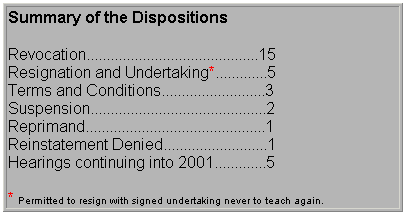
T h e F i t n e s s t o P r a c t i s e C o m m i t t e e
The Fitness to Practise Committee rules on any allegation of incapacity on the part of a College member. Cases may be referred to the committee by the Investigation Committee, the Executive Committee or the Council. When a complaint is received, the committee holds a hearing to determine whether physical or mental conditions or disorders exist that make a member unfit to carry out professional responsibilities. Hearings are not normally open to the public.
Committee Activities
The committee met twice and discussed the Robins report, the role of independent counsel, dealing with agreed statements of fact and joint submissions on disposition. It also discussed the mechanism for redirecting a matter to the Discipline Committee. The new committee attended a two-day training program on December 4 and 5, 2000.
Panels of the Fitness to Practise Committee held four hearings during 2000. Two of these hearings involved the same member, with the second hearing dealing with a breach of the terms of the first hearing. In one of the other cases the hearing continued into 2001.
T h e A c c r e d i t a t i o n C o m m i t t e e
The Accreditation Committee reviews and accredits pre-service and in-service teacher education programs.
Committee Activities
Pre-service Teacher Education
The Accreditation Committee met five times during 2000 and completed the pilot program of initial accreditation reviews of pre-service programs. During the third and final year of the pilot, accreditation panels conducted reviews at Brock University, Lakehead University, the Ontario Institute for Studies in Education of the University of Toronto and the University of Western Ontario.
The Accreditation Committee reviewed the panel reports and recommendations in June. Lakehead University requested that Council reconsider its initial accreditation award. In September, the committee approved the Program of Professional Teacher Education Accreditation Handbook and Appendices for future accreditation reviews. Companion documents for the pre-service accreditation process were also revised.
In response to requests for accreditation of new programs for professional teacher education, the Accreditation Committee approved an outline for accrediting new pre-service programs. In June, the committee granted interim accreditation to the new Master of Teaching program at OISE/UT.
In-service Teacher Education
The Accreditation Committee approved a draft of the In-service Handbook to be sent to education stakeholders throughout the province for consultation and also approved a process for the registration of providers of in-service programs. The Committee approved the revised draft of In-service Initial Accreditation Handbook for Regulation 184/97 Programs. All Honour Specialist courses, Additional Basic Qualification courses and Principal’s Qualification Programs (PQP), Parts I and II offered in the province were reviewed in 2000.
The Accreditation Committee reviewed revisions to the PQP, Parts I and II and a consortium of the three principals’ organizations (Catholic Principals’ Council of Ontario, Ontario Principals’ Council and the Association des directions et des directions adjointes des écoles franco-ontariennes) was selected to offer the revised PQP in the Ottawa area.
The committee began work on an orientation program for applicants to the College who have completed their professional teacher education program outside Ontario and initiated an extensive consultation process to consider revisions to the Technological Studies Additional Basic Qualifications courses and subsequent accreditation process.
T h e S t a n d a r d s o f P r a c t i c e a n d E d u c a t i o n C o m m i t t e e
The Standards of Practice and Education Committee advises Council on the development and use of pre-service and in-service standards of practice, ethical standards, and a professional learning framework to support the standards of practice.
Committee Activities
The Standards of Practice and Education Committee met six times in 2000. On the recommendation of the committee, Council approved placing the five standards of practice statements contained in Standards of Practice for the Teaching Profession in the College bylaws, concluding the developmental and consultative process to create the standards of practice.
The validation process for the Ethical Standards for the Teaching Profession ended in May 2000, and the Council approved placing the ethical standards in the College bylaws. The committee approved a revised draft guideline for the Principal’s Qualification Program and sent the guideline for provincial consultation to educational stakeholder groups.
The committee discussed a paper dealing with distance learning and teacher in-service education. Consultation with educational stakeholder groups on the discussion paper, as well as the development of a support document developed by the College on the subject, will take place in 2001. Another important activity was the province-wide consultation for revisions to the Additional Qualification courses on Associate Teacher and Student Assessment and Evaluation. These were the first revisions to all the programs and courses outlined in the schedules of Regulation 184/97 that will be undertaken by the committee.
The Standards of Practice and Education Committee acknowledges and appreciates the continuing contribution made by members of the College and the public to its work.
T h e I n v e s t i g a t i o n C o m m i t t e e
The Investigation Committee receives and investigates complaints of professional misconduct, incompetence or incapacity against members of the College unless it considers the complaint is outside its jurisdiction or is frivolous, vexatious or an abuse of process.
Committee Activities
Panels of the committee met 10 times and considered 96 complaints. Approximately 32 per cent of the complaints were referred to the Discipline Committee or the Fitness to Practise Committee. The committee also met to consider legal opinions, the recommendations of Protecting our Students: A Review to Identify & Prevent Sexual Misconduct in Ontario Schools, procedures, motions proposed to Council and training for committee members. Two complaints were resolved using the dispute resolution program developed in 1999.
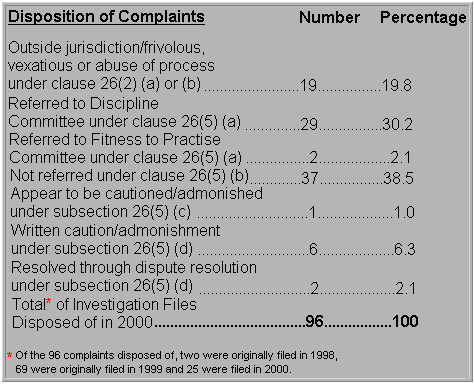
One of the decisions of the Registration Appeals Panel Review Committee was appealed at the Divisional Court level. The appeal was dismissed after the judge deemed the issues raised by the appellant to “relate to matters squarely within the expertise of the committee” and concluded that there was no merit to the appeal.
T h e E l e c t i o n C o m m i t t e e
This special committee, comprised of three elected and two appointed Council members, recommends regulations and bylaws to govern Council elections. In an election year, the committee also oversees the election process.
Committee Activities
In May 2000, a new election regulation to govern Council elections in 2000 and beyond was approved by the provincial government. As 2000 was an election year, the committee met twice to review voting procedures, confirm an election schedule and approve the administrative processes for the call for nominations, voter list development, ballot distribution and tabulation. The second Council elections were held in October 2000.
T h e Q u a l i t y A s s u r a n c e C o m m i t t e e
The Quality Assurance Committee is a special committee of Council set up to assess the College’s performance relative to the 11 objects in the Ontario College of Teachers Act. The Quality Assurance Committee presented its final report to Council in February 2000. The report provided Council with a detailed analysis of the College’s progress towards fulfilling each of the objects of the College and included a number of recommendations that were considered by Council at its June meeting.
S t a t i s t i c s
Sources of this data are the Ontario College of Teachers membership register, the financial records of the College and the evaluation services files.
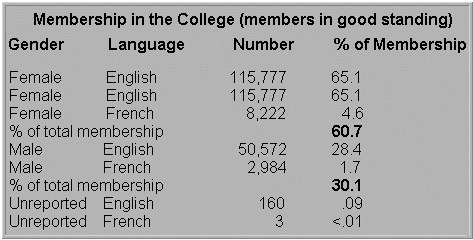
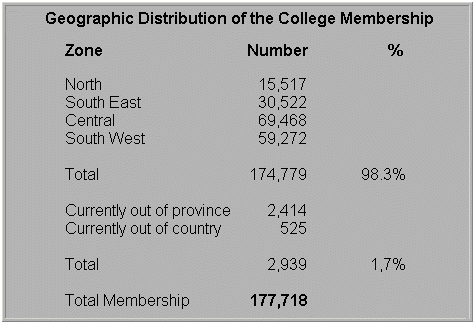
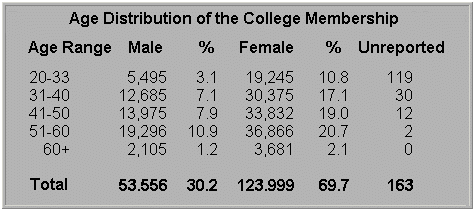

T h e F i n a n c e C o m m i t t e e
The Finance Committee reviews and reports to the Council on all matters pertaining to the financial affairs of the College. The Finance Committee also reviews and makes recommendations about membership and other fees and reviews investment performance to ensure maximum performance within the Council’s approved guidelines for investments. As well, the Finance Committee functions as the College’s audit committee.
Committee Activities
During 2000 the committee worked on long-term financial planning, reviewed an audit of expense claims and reviewed amended budgets for the Investigation and Discipline Committees and for the project to convert microfiche records to a digital format. The committee also reviewed reports about the College’s insurance program, procedural changes to the annual fee collection process, occupational health and safety, security within the College premises, a request to establish differential fees for members and the College guidelines for travel expenses.
B l u e P a g e s A r t i c l e s
|
|

